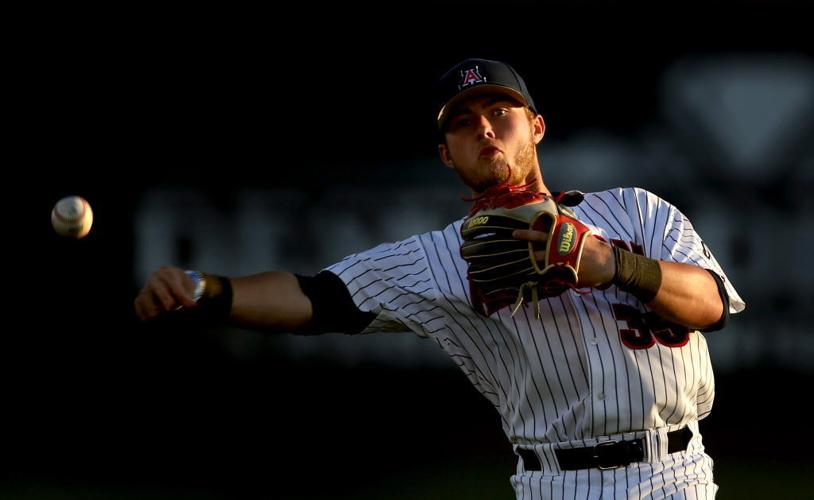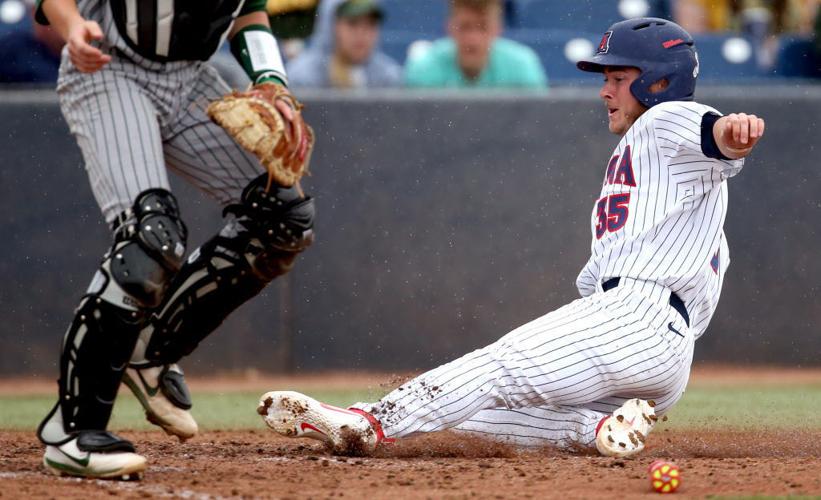Cameron Cannon first learned how to play baseball on a sand volleyball court in a Peoria apartment complex.
Cannon and his older half-brother, Tanner Murphy, would prep the court as if they were major-league groundskeepers. They would rake and tamp the sand. They would use baby powder to make foul lines. They would gather other kids from the apartment complex to play games. Hitting the ball over the net earned a trip around the bases.
“We were swinging for the fences,” Murphy recalled Wednesday.
Murphy was 9 years old at the time; Cannon was 4. They bonded over baseball and still do, even though Murphy lives in Colorado and Cannon in Tucson, where he’s the starting second baseman — and biggest breakout player of 2018 — for the Arizona Wildcats.
“He’s pushed me to be the best I can be, ever since we were little,” Cannon said. “I learned everything from him.”
Many deserve credit for Cannon’s development, including Cannon himself, UA coach Jay Johnson and his staff. The sophomore is batting .356 entering Arizona’s three-game series against Nicholls State that starts Thursday at Hi Corbett Field.
He ranks second on the team in RBIs (21) and first in the Pac-12 in defensive assists (79). Selected by the Diamondbacks in the 21st round of the 2016 MLB draft, Cannon has solidified himself as a pro prospect.
It all started with the games he played and the lessons he learned from his older brother.
Murphy preceded Cannon as a baseball star at Glendale Mountain Ridge High School and turned pro after the Baltimore Orioles picked him in the 22nd round of the 2010 draft.
A left-handed-hitting catcher, Murphy played minor-league ball until last year. He’s currently a baseball instructor at the Sport Stable in Superior, Colorado, a suburb of Denver.
Murphy has plenty of experience. Whatever he learned from his coaches, he’d pass along to his younger brother.
One example: Murphy’s freshman coach in high school told him to carry himself like a businessman after striking out. That way, the coach reasoned, the opposing team wouldn’t know if you had a good at-bat or a bad one.
Cannon always had a ball in his hand, Murphy said. Often it was a racquetball that Cannon would bounce off the wall in the apartment complex’s community room or whip into the living-room couch. Or the one Murphy described as a “light-up bouncy ball” that Cannon carried “for a whole year.”
All those repetitions helped Cannon develop the instincts that have enabled him to play what Johnson labeled “major-league second base for us defensively.”
“His subconscious mind was constantly being worked,” Murphy said. “Fielding a groundball became natural. It wasn’t a coach pushing him. It was a natural instinct for him to want to play with a ball, to have something in his hands.”
The brothers would push each other. They’d wake up two hours before school to field grounders. Murphy would write goals — such as doing 100 push-ups and sit-ups a day — with a dry-erase marker on the bathroom mirror.
When their family — including mom Kim, a nurse at the Mayo Clinic — moved into their first house, the boys went to work on the backyard. They ripped out trees and plants and shoveled aside rocks to make way for a pitching mound and a makeshift infield. They would field grounders until the sun set and smack baseballs after dark.
“We would hit them into the net,” Murphy said. “You’d hear pings until 12 o’clock at night.”
While the noise perturbed their neighbors, all that practice made the brothers better ballplayers. Cannon batted .364 as a shortstop at Mountain Ridge, including .412 as a junior.
He was sitting in the kitchen with his mother in June 2016 when his name popped up on MLB.com’s draft tracker.
Cannon was committed to Arizona, but he spent about a week talking to his family and thinking about whether to sign with the Diamondbacks.
Unlike his brother, Cannon decided college was his best route. The Wildcats played in the College World Series that June, and Johnson had a track record for grooming pro players.
“I wanted to come here and just develop as a baseball player and person and get my degree eventually,” Cannon said. “No regrets at all. If I had to go back and do it again, I’d 100 percent choose Arizona.”
Cannon appeared in 35 games, including 27 starts, as a freshman. He batted .274. He has improved markedly as a hitter and fielder over the past year.
In about the same number of at-bats — 87 this year, 84 last year — Cannon has three times as many RBIs. His batting average has risen by 82 points, his slugging percentage by 115.
Cannon — who’s listed at 5-10, 196 pounds — is fitter than as a freshman, reducing his body-fat percentage from 13 to 9 thanks to late-night workouts after summer games with the La Crosse Loggers of the Northwoods League. He’s also healthier after dealing with a hand injury that required offseason surgery.
“He’s arguably one of the best pro prospects on our team,” Johnson said. “He’s got a body that I think can sustain professional baseball. He hits the ball with some authority, which, as he continues to mature, he’ll do more of.
“His ability to turn the double play, to range up on plays in the infield — he’s done a really nice job there. I’m happy with his evolution as a player, and I have no doubt that it’ll continue.”
Murphy subscribes to the American ideal that anyone can accomplish anything if they set their mind to it. Injuries derailed his playing career, but Murphy believes his brother can make it to the majors. When they were playing pickup games as kids, big-league ball wasn’t just some fantasy.
“It was not our dream,” Murphy said, “but our goal.”
Inside pitch
- Arizona hadn’t announced starting pitchers for Nicholls State as of Wednesday, but Johnson suggested the order could be shuffled with the series starting Thursday.
- The Wildcats don’t play on Easter Sunday, but they will travel to Albuquerque for a Monday game against New Mexico.
- Oregon State, whom Arizona hosts April 6-8, is ranked No. 1 in every major poll. Stanford, which visits Tucson two weekends later, is No. 3.
- Arizona is third in the Pac-12 with a 2.48 ERA, trailing Stanford (1.96) and UCLA (2.41). The Wildcats are tied for the fewest home runs allowed (six) but also have hit the fewest (four).
- Junior right-hander Cody Deason ranks second in the conference with 41 strikeouts in 39 innings.
- Cesar Salazar and Ryan Haug have been hit by pitches eight times apiece, tied for most in the league.





